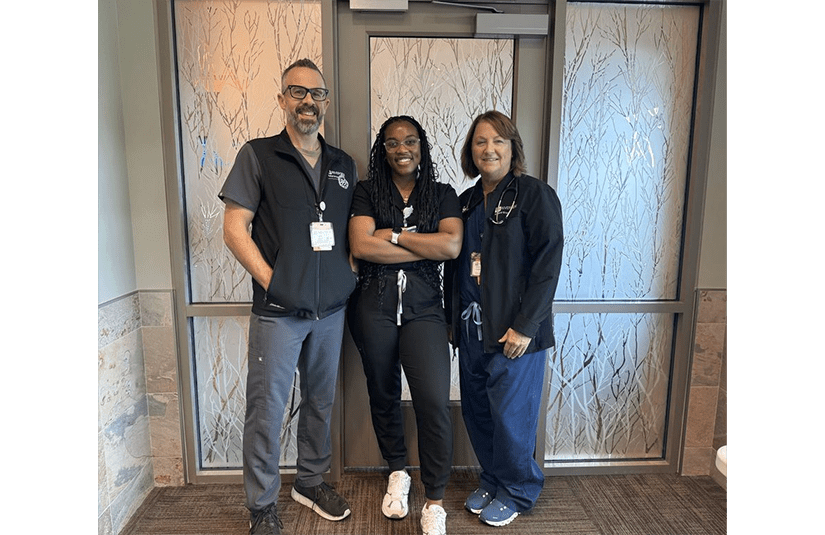When the fellowship faculty first introduced Amani Jones, PA, to Riverside’s intensive care unit (ICU) team last October as the new critical care APP fellow, she was overwhelmed by patients’ critical state. “There was so much involved in managing just one of them. Some providers would have five or six patients at a time, and I couldn’t imagine eventually getting to that level,” she says.
Today, Jones has completed the first-ever Advanced Practice Provider Critical Care Fellowship at Riverside. In the year-long program, she progressed from practicing simulated critical care procedures to performing them on patients as second nature. “There is so much involved in managing a critically ill ICU patient that takes time and experience to learn,” says Jones.
Riverside’s APP fellowship allows new providers to gain additional training in multiple specialty settings. In addition to critical care training, APP fellows rotate through several specialty areas with the medical experts.
“Our goal for the fellowship is to have quality providers with the capacity to work at the top of their license. This fellowship is an ideal way to supplement the broad APP education in a subspecialty,” says Terry Thompson, ACNP, FHM, associate director of advanced practice providers.
APP fellowships help meet patient care gaps
Advanced practice providers (APPs), which include nurse practitioners and physician assistants, are critical to reducing health care shortages. By 2036, the United States is expected to have a shortage of up to 86,000 physicians, according to the American Academy of Medical Colleges. “We’re seeing the pendulum swing to having more APP fellowship programs throughout the country to aid in the physician shortage, and we'll continue to see this trend in the coming years,” says Liz Palmer, PA-C, associate director of the APP fellowship.
Riverside Health is the only health system in Southeastern Virginia to launch a critical care APP fellowship program, joining other hospitals across the nation committed to elevating these providers.
In an 18-bed ICU like Riverside Regional Medical Center (RRMC), adding another provider to work with the physicians significantly increases the team’s capacity to diagnose and treat patients and support their families. “Instead of one physician overseeing all of those patients, the APP can collaborate with the critical care physician to deliver the highest level of care,” says John Waite, FNP, associate director of the APP fellowship.
APPs are prepared in school to meet most primary care needs, but critical care requires additional training for standard ICU procedures. Thanks to more advanced technology, patients in critical care settings today are more complex and survive longer.
APPs are licensed to perform some of the same procedures as doctors. “We are all about team-based care where everyone brings something different to the table that enhances that patient's outcome,” says Thompson.
Shaping a new APP fellowship program
Designing the new APP fellowship program at Riverside took months of planning from a team committed to developing the most effective opportunity possible.
“I'm proud of Riverside for seeing the benefit of having fellowships as a way to develop a pipeline of very qualified, competent and capable providers,” says Thompson.
The fellowship includes three essential components:
Critical care training: The fellowship launches with training in a state-of-the-art simulation lab, followed by learning to perform procedures on patients. The rigorous academic year-long program includes case reporting and lectures. By the end of the one-year training, the fellow can confidently perform common ICU procedures.
Multiple subspecialty rotations: The fellow spends a few weeks gaining experience in various subspecialties, including surgical critical care, nephrology, urology, cardiology, vascular surgery and neurology.
Data-driven research project: The fellow researches one area of critical care that needs improvement. This year’s project was preventing IV infiltration of vasoactive medications –– the accidental leakage of drugs from the vein into the surrounding tissue during intravenous administration. After months of research, the fellow presented findings to the rest of the clinical team on reducing the adverse events.
Gaining confidence in critical care as an APP
There are three common procedures in the ICU: arterial lines, central lines and intubations. Jones began her training with central lines, which she performed minimally with assistance during PA school.
In the fellowship, Jones became credentialed by performing the procedure many times with supervision before being able to perform one on her own.
Her first central line on a patient went well, but she remembers being nervous and taking a long time. Now, she is confident and completes them in half the time. “I know exactly what I need to do, how to troubleshoot and adjust. The setup and takedown are more efficient as I move through it much more easily,” she says.
The transition from being a new provider to becoming an experienced clinician was rewarding for Jones and for her supervisors and colleagues. “We practiced procedures on mannequins in the Simulation Lab at RRMC and then saw her get positive feedback from her first patient. We then even saw her return to her alma mater to teach their students how to perform those same procedures in their clinical rotation,” says Palmer.
The second APP fellowship cohort at Riverside began training in the critical care unit in October 2024. Everyone who worked hard to develop the fellowship couldn’t help but appreciate seeing Jones join the interview process to select a new fellow. “It was surreal seeing Amani proudly share her experience with the interviewees. We realized we did it, and we're going to have more,” says Palmer.
As Jones moves on as an experienced critical care provider, she’s grateful for all she learned as an APP fellow at Riverside. “Repetition and reassurance from my attendings and preceptors have been key. They let me challenge myself and gave me time to figure things out, but I knew my team was there if needed.”
Learn more about the APP critical care fellowship at Riverside.
